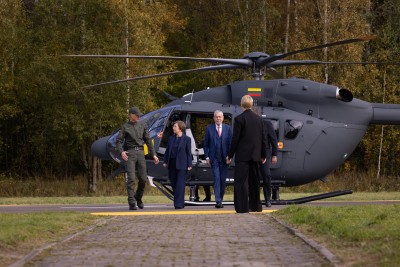Van der Bellen in the Baltic States: Strong Words for Europe's Security at the EU's External Border
The multi-day trip to the Baltic states by Austrian President Alexander Van der Bellen, together with Doris Schmidauer, began in Lithuania and highlighted the central role of European security and the strengthening of economic relations in the region.
 To learn more about the current situation on the Lithuanian-Belarusian border, the situation was explained to him during a helicopter flight. / Picture: © Österreichische Präsidentschaftskanzlei / Peter Lechner/HBF
To learn more about the current situation on the Lithuanian-Belarusian border, the situation was explained to him during a helicopter flight. / Picture: © Österreichische Präsidentschaftskanzlei / Peter Lechner/HBF
After arriving and being welcomed with military honors at the Presidential Palace in Vilnius, President Van der Bellen traveled to the Padvarionys border post on the Lithuanian-Belarusian border the following day. During an on-site inspection and a briefing with the Lithuanian Minister of the Interior and border guard units, the Federal President gained direct insight into the current challenges at the EU's external border. Lithuania, which borders Belarus to the east, is directly exposed to hybrid attacks, including in particular the targeted exploitation of vulnerable migrants by the Lukashenko regime.
After flying over the border area by helicopter, Van der Bellen reaffirmed European solidarity: “Lithuania borders Russia and Belarus and is therefore directly exposed to hybrid attacks from the east. Here on the ground, it is clear that protecting the border with Belarus is very important for Lithuania's security – and in the interests of us all.”
The current geopolitical situation in the region is tense. Military exercises such as the Russian-Belarusian “Sapad” manoeuvres regularly cause concern and reactions from Lithuania, such as the extension of the closure of airspace along the border.
Economic partnership and Rail Baltica infrastructure project
The Federal President's visit also served to strengthen Austrian-Lithuanian economic relations. Van der Bellen visited the production site of voestalpine Railway Systems Lietuva in the village of Valčiūnai near Vilnius. The company, which was founded in 1995 as a joint venture, specializes in the manufacture of switches for railway construction and employs 80 people.
“With its flourishing economy and know-how, Lithuania is an interesting economic partner for Austria,” emphasized the Federal President. He highlighted the Rail Baltica infrastructure project as one of the greatest opportunities for Austrian companies in the Baltic region.
The major Rail Baltica project aims to connect the Baltic states to the Western European network via an 870-kilometer electrified high-speed line on European standard gauge (1435 mm). By the end of 2025, 43 percent of the main line is expected to be ready for construction, with the aim of full commissioning in 2030. In addition to economic integration, the railway line is also seen as a strategic enabler for NATO's defense and military mobility in the region.
Joint strength of the European Union
In his statement after talks with President Nausėda, Van der Bellen made an urgent appeal for a united stance by the European Union on security issues. He emphasized the central role of the Baltic states for the security of the EU as a whole: "The Baltic states play a crucial role in the security of the EU. We, as European neighbors, also play a crucial role in the security of the Baltic region. We, the European Union, are 27 member states and 450 million people. We are a strong team. Let us also translate this strength into security. The time for this is now."
The Baltic trip ends with participation in the 20th Arraiolos Meeting in Tallinn, Estonia. At this informal meeting of non-executive heads of state of the EU, the Federal President will discuss the current challenges facing Europe with numerous counterparts, including President Alar Karis (Estonia), President Frank-Walter Steinmeier (Germany), President Sergio Mattarella (Italy), President Edgars Rinkēvičs (Latvia), and President Karol Nawrocki (Poland).



